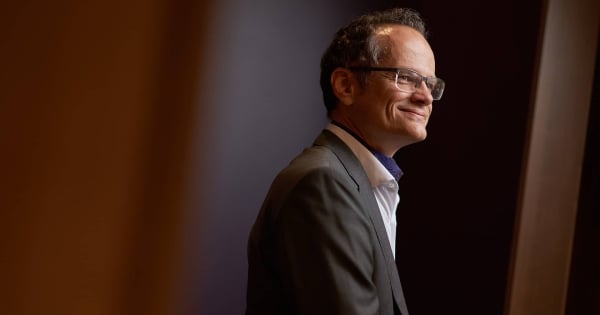You have /5 articles left.
Sign up for a free account or log in.

Artificial intelligence is becoming a more prominent consideration when it comes to filling new roles.
Artificial intelligence is moving from the classroom into the C-suite, as higher ed institutions seek to bring AI knowledge and skills into leadership positions.
Western University, based in Ontario, Canada, is one of the first academic institutions in the world to create a top-level AI role, with Mark Daley starting as chief artificial intelligence officer earlier this week.
“It was, ‘How can we as an institution respond to what we think is a pretty special moment in time?’” said Daley, who started at Western University in 2015 and most recently served as chief digital information officer. His five-year term as chief AI officer began Oct. 15.
Beyond higher ed, the concept of a chief AI officer isn’t new. Over the past few years, the corporate world has waded into CAIO territory with appointments at companies like Deloitte, GE Healthcare and eBay. Levi’s added their own chief AI officer as early as 2019, long before the general public took note of the technology with the debut of ChatGPT a year ago.
Higher education has been slower to adopt C-level changes, despite some institutions investing heavily in AI and hiring hundreds of employees focused on teaching the technology. However, institutions began asking in the spring about including AI in job postings for provosts and presidents, according to Shawn Hartman, chief operating officer at Academic Search.
“People were like, ‘Wait a minute, I heard about this but don’t know what it was,’ and now it’s starting to impact [job postings],” Hartman said. He cautioned that chief AI officers could face a challenge similar to that of chief diversity officers: “They’re one person, but they’re responsible for all diversity, when it needs to be an institutional focus.”
Daley appears to be the first top-level chief AI officer at a higher education institution. The McSilver Institute for Poverty Policy and Research at New York University did hire a CAIO in March 2022, but, unlike Daley’s, it was not a universitywide position.
In an interview with Inside Higher Ed, Daley joked that soon after he got the AI job, “the University of Sussex in the U.K. called, saying, ‘Darn you, we thought we were gonna be the first in the world.’” The interview has been edited for length and clarity.

Mark Daley, chief AI officer at Western University
Photo/Geoff Robins
Q: How did you come to land the position? Did you go to the university saying, “We need to have this position,” or did they approach you?
A: It was an organic conversation between provosts and the president. ChatGPT was a moment in time, and they knew I was an advocate for AI, but ChatGPT was where everything lit on fire. Immediately the conversation with them was “How are we going to respond to this?” And that was the genesis [in November 2022].
Q: What’s the first thing you’re going to do in the role?
A: Job No. 1 is consulting with the community. I have my preconceived ideas but need to listen programmatically to what students, staff and faculty would want—and also where they’re concerned and what their fears are.
I very much see it as a node in the network-type operation. My role is to advance and help us through the transition and to represent my institutions in external conversations about AI.
Q: Many academics have cited concerns about AI. Do you expect to hit any pushback from your colleagues on the use of AI?
A: When ChatGPT first came out, there was a lot of shock and hesitation—and that’s very fair; I’ve been in the field for 20 years and even I was shocked at the pace this accelerated.
But over the last eight months, we’ve seen a huge shift from initial hesitation to not just acceptance but enthusiasm. And what’s cool about [AI] is students are leading the conversations [on its possibilities]. They see they will inhabit a world where this is relevant, and that enthusiasm is washing off on us old people.
Q: Have you had other institutions reach out to learn to implement their own CAIO?
A: My inbox has been filled with, ‘Hey can we talk? We’re thinking of doing something similar,’ and that’s fantastic. Every university will have to deal with AI; the approach will be different, but we’re all grappling with the same core set of challenges.
Q: What are those challenges?
A: How do we best employ this to make institutions strong and efficient? How to train a generation of young people to not just be comfortable, but fluent [in AI]. And what are the research opportunities? This is a technology that can be used to raise the standard in a lot of areas of research, to take away the drudge work, to focus time and activity where it’s most valuable.
Q: What advice would you give to an institution that wants to implement their own CAIO?
A: First and foremost, you have to think, ‘What are the objectives for the institution? If it’s R-1, it will have different needs than a small private college. Just like there’s no one-size-fits-all solution to AI, it’s the same with AI leadership.
The danger in having a C-suite [position] linked to a single technology is you become too excited about it. So, the most important piece of advice—and I hope I can take this advice myself—is what does the community want? What are the aspirations, what are the concerns and how do we address those?
Q: How heavily should universities be leaning into AI?
A: I don’t think we’ll need an office of AI in our institution; it’ll be everywhere. You don’t have a Department of Running Water. AI will be core infrastructure, a topic we teach and research. We don’t need to duplicate them. My role is to transform the existing mechanism, to pick up the exciting opportunity.
Q: Do you think every institution should have a CAIO?
A: Every institution is going to deal with this differently, but it’s a recognition from senior leadership that this is important and helpful to have someone with the background supporting a university through the transition.









